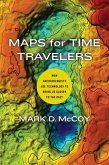Wayward Shamans tells the story of an idea that humanity's first expression of art, religion and creativity found form in the figure of a proto-priest known as a shaman. Tracing this classic category of the history of anthropology back to the emergence of the term in Siberia, the work follows the trajectory of European knowledge about the continent's eastern frontier. The ethnographic record left by German natural historians engaged in the Russian colonial expansion project in the 18th century includes a range of shamanic practitioners, varied by gender and age. Later accounts by exiled Russian revolutionaries noted transgendered shamans. This variation vanished, however, in the translation of shamanism into archaeology theory, where a male sorcerer emerged as the key agent of prehistoric art. More recent efforts to provide a universal shamanic explanation for rock art via South Africa and neurobiology likewise gloss over historical evidence of diversity. By contrast this book argues for recognizing indeterminacy in the categories we use, and reopening them by recalling their complex history.
Dieser Download kann aus rechtlichen Gründen nur mit Rechnungsadresse in A, D ausgeliefert werden.









